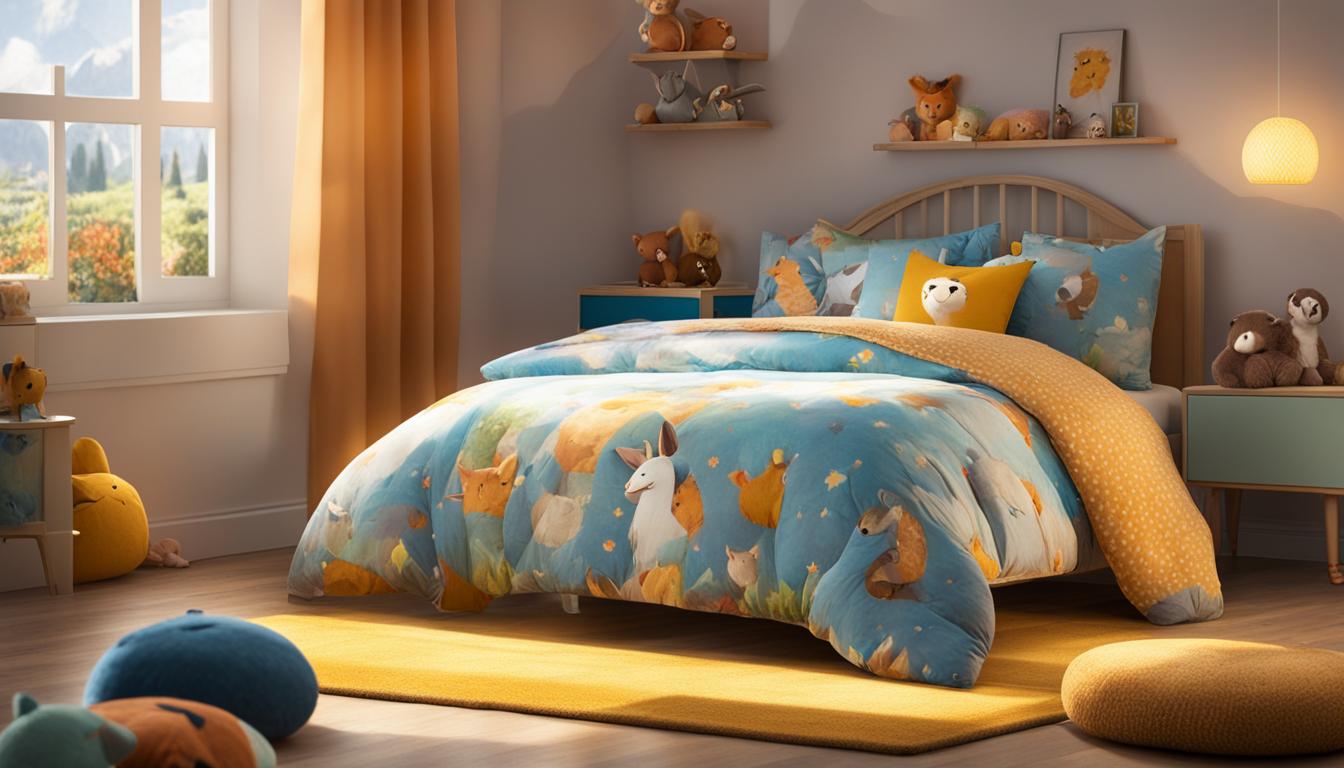Hypoallergenic Bedding Fabric Types: Choosing the Best for Allergy-Free Sleep!
If you suffer from allergies, finding the right bedding can make a world of difference in your quality of sleep. Opting for hypoallergenic bed sheets made of natural fibers is recommended as they are breathable and can prevent the spread of dust mites. When it comes to hypoallergenic bedding fabric types, there are several options to consider.
One of the best hypoallergenic fabric choices for bedding is bamboo. Bamboo sheets have natural moisture-wicking properties, making them ideal for those who tend to sweat during the night. Silk is another excellent option, offering natural protection against allergens and a luxurious sleep experience. Cotton is a popular choice for its affordability, ease of cleaning, and breathability. Linen, with its unique filtering properties, and microfiber, which is wrinkle-resistant, also have their own benefits for allergy sufferers.
Key Takeaways:
- Choose hypoallergenic bed sheets made of natural fibers for allergy-free sleep.
- Bamboo sheets have moisture-wicking properties and prevent the spread of dust mites.
- Silk sheets offer natural protection against allergens and are great for sensitive skin.
- Cotton sheets are affordable, easy to clean, and hypoallergenic.
- Linen and microfiber also have their own benefits for allergy sufferers.
The Benefits of Bamboo Sheets for Allergy Sufferers

If you suffer from allergies, finding the right bedding can make all the difference in getting a good night’s sleep. One excellent option for allergy sufferers is bamboo sheets. Not only are they comfortable and luxurious, but they also offer a range of benefits that can help alleviate allergy symptoms and promote better sleep.
Natural Breathability and Moisture-Wicking Properties
Bamboo fabric is known for its natural breathability and moisture-wicking properties. This means that it can effectively regulate your body temperature by allowing air to circulate and wicking away moisture from your skin. For allergy sufferers, this is especially important as it helps prevent the build-up of allergens such as dust mites and mold, which thrive in warm, damp environments.
Hypoallergenic and Allergy-Friendly
Bamboo sheets are hypoallergenic, making them an ideal choice for those with allergies. The fabric is naturally resistant to allergens, including dust mites and mold, which can trigger allergic reactions. By choosing bamboo sheets, you can create a healthier sleeping environment that is less likely to exacerbate your allergy symptoms.
Softness and Comfort
Aside from their allergy-friendly properties, bamboo sheets are also incredibly soft and luxurious. They offer a silky-smooth feel against the skin, providing you with a comfortable and cozy sleep experience. The softness of bamboo fabric can help soothe sensitive skin and prevent irritation, making it an excellent choice for individuals with allergies or skin sensitivities.
Eco-Friendly and Sustainable
Another advantage of bamboo sheets is their eco-friendliness. Bamboo is a highly sustainable material that grows quickly without the need for pesticides or chemicals. It also has a minimal impact on the environment compared to other fabrics. By choosing bamboo sheets, you can enjoy the benefits of allergy relief while also making an environmentally conscious choice.
| Bamboo Sheets Benefits for Allergies | |
|---|---|
| Natural breathability and moisture-wicking properties |
|
| Hypoallergenic and allergy-friendly |
|
| Softness and comfort |
|
| Eco-friendly and sustainable |
|
Overall, bamboo sheets provide an excellent option for allergy sufferers who are looking for bedding that offers both comfort and relief from allergens. Their natural breathability, moisture-wicking properties, hypoallergenic nature, and softness make them a top choice for a restful and allergy-free sleep.
The Allergy-Friendly Properties of Silk Sheets

Silk sheets are another excellent choice for allergy sufferers. Made from a high-quality natural fiber, silk is known for its luxurious softness and hypoallergenic properties. When it comes to hypoallergenic bedding fabric types, silk stands out for its numerous benefits.
One of the key advantages of silk sheets is their natural protection against allergens. Silk fibers are spun by silkworms in a way that forms a protective barrier against common allergens like pet dander and dust mites. This helps minimize exposure to these allergens, reducing allergy symptoms and providing a more comfortable sleep experience.
Furthermore, silk sheets offer relief for those with sensitive skin. The smooth, gentle texture of silk can help soothe irritated skin, making it an ideal choice for individuals with skin sensitivities or conditions like eczema.
Additionally, silk fabric has natural moisture-wicking properties, helping to regulate body temperature and prevent the buildup of moisture that can attract allergens. This makes silk sheets a great option for those prone to night sweats.
The Benefits of Silk Sheets for Allergies:
- Silk provides natural protection against allergens like pet dander and dust mites.
- It offers relief for individuals with sensitive skin or skin conditions.
- Silk fabric has moisture-wicking properties, helping to regulate body temperature and prevent the buildup of moisture.
When choosing hypoallergenic bed sheets, silk offers a combination of comfort, luxury, and natural allergen protection. Incorporating silk sheets into your bedding can help create a sleep environment that promotes better sleep quality and reduces the impact of allergens.
The Natural Hypoallergenic Qualities of Cotton Sheets
Cotton sheets are a popular choice for hypoallergenic bedding due to their natural properties and affordability. Made from the cotton plant, this natural fiber offers several benefits for allergy sufferers.
Breathability and Comfort
Cotton fabric is highly breathable, allowing air to circulate and keeping you cool during hot nights. Its porous nature enables heat and moisture to escape, preventing the build-up of sweat and creating a comfortable sleeping environment. The breathability of cotton sheets helps allergy sufferers by reducing the chance of mold and mildew growth, which can trigger allergies.
Naturally Hypoallergenic
Cotton is inherently hypoallergenic, making it an excellent choice for individuals with allergies or sensitive skin. It does not contain synthetic fibers or chemicals that can irritate allergies, allowing for a more peaceful sleep experience. When selecting cotton sheets, make sure to choose 100% cotton options and avoid blends with synthetic materials.
Easy to Clean
Cotton sheets are easy to clean and maintain, which is essential for allergy sufferers. They can be machine washed and dried without losing their hypoallergenic properties. Regular washings help remove allergens, such as dust mites and pollen, ensuring a fresh and clean sleeping environment.
Overall, cotton sheets are a reliable choice for hypoallergenic bedding. Their breathability, hypoallergenic nature, and ease of cleaning make them suitable for individuals with allergies. Invest in high-quality, 100% cotton sheets to enjoy a comfortable and allergy-free night’s sleep.
Conclusion
When it comes to creating an allergy-free sleep environment, choosing the right hypoallergenic bedding fabric types is essential. Each fabric option offers its own unique benefits and properties that can cater to different individuals with specific allergies and sensitivities.
Options such as bamboo, silk, cotton, linen, and microfiber are all excellent choices for hypoallergenic bedding. Bamboo sheets, known for their breathability and moisture-wicking properties, can help prevent the spread of dust mites and mold. Silk sheets offer natural protection against allergens and are particularly suitable for those with sensitive skin. Cotton sheets, on the other hand, are affordable, easy to clean, and highly breathable, making them ideal for those sensitive to mold and mildew. Meanwhile, linen sheets provide unique filtering properties, and microfiber sheets offer wrinkle resistance.
By selecting the best hypoallergenic fabric for your bedding, you can enjoy a restful, allergy-free sleep and wake up feeling refreshed and rejuvenated. Take into consideration the benefits of each fabric type, as well as your personal preferences, to make an informed decision. Investing in hypoallergenic bedding is not only beneficial for your health, but it also contributes to a comfortable and peaceful night’s sleep.
FAQ
What are the best fabric types for hypoallergenic bedding?
The best fabric types for hypoallergenic bedding include bamboo, silk, cotton, linen, and microfiber.
Are bamboo sheets hypoallergenic?
Yes, bamboo sheets are hypoallergenic. They are breathable, moisture-wicking, and can help prevent the spread of dust mites.
Do silk sheets have allergy-friendly properties?
Yes, silk sheets have allergy-friendly properties. Silk is naturally hypoallergenic and provides protection against allergens like pet dander and dust mites.
Are cotton sheets suitable for allergy sufferers?
Yes, cotton sheets are suitable for allergy sufferers. Cotton is naturally hypoallergenic, breathable, and helps prevent mold and mildew.
How do I choose the best hypoallergenic bedding fabric?
When choosing hypoallergenic bedding fabric, consider your specific allergies and sensitivities. Each fabric has unique benefits, so choose the one that suits your needs and preferences.




